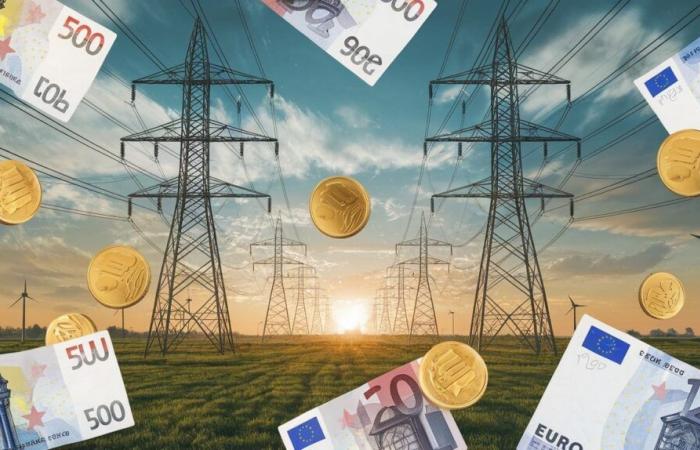Bad news for your wallet… The Court of Auditors warns of a massive increase in electricity bills in the coming years. In question, the method of financing networks which could cause prices to skyrocket by €10/MWh by 2030. Find out why your bill is likely to increase and what is hidden behind this controversial electricity “toll”…
While energy prices are soaring, a new report from the Court of Auditors has sounded the alarm on the method of financing French electricity networks. The latter, described as an “electricity toll”, risks significantly increasing consumers’ bills in the decade to come. A difficult pill to swallow for households already strangled by galloping inflation…
A controversial “electric toll”
The famous “electric toll” singled out by the magistrates of rue Cambon is none other than the Tariff for the Use of Public Electricity Networks (TURPE). The latter makes it possible to remunerate network managers, namely RTE for high and very high voltage, Enedis for medium and low voltage, as well as some local distribution companies.
In short, it is a tax levied on each megawatt hour passing through the networks to transport electricity from power plants to final consumers. A “toll” essential for the proper functioning and maintenance of infrastructure, but the method of calculation of which is considered opaque and inflationary by the Court of Auditors.
A financing method considered “too favorable” to operators
According to the report, TURPE would indeed be far too generous towards RTE and Enedis. The Court estimates that the latter each benefited from a “financial gain of nearly 500 million euros” between 2017 and 2023, in particular due to an overvaluation of the risk linked to their investments.
A situational rent which would result in excessive prices for users. The Sages of Rue Cambon therefore recommend reviewing the copy on the method of remuneration of network managers, as well as their dividend distribution policy, in order to contain the increase in TURPE.
Colossal investment needs in networks
The problem is that RTE and Enedis face massive investment needs to modernize and adapt their infrastructures to new energy challenges. The development of renewable energies, the electrification of uses or even the growth of charging stations require heavy work.
RTE is therefore counting on a budget of 100 billion euros by 2040, while Enedis will have to spend no less than 96 billion over the same period. Huge amounts which will ultimately have to be passed on to consumers’ bills via the famous “toll”.
A risk of temporary oversizing of networks
To make matters worse, the Court of Auditors warns of a possible oversizing of networks in the years to come. Indeed, RTE and Enedis anticipate strong growth in electricity consumption to calibrate their investments.
However, the latter is currently at half mast, due in particular to the efforts towards sobriety and energy efficiency made by households and businesses. A gap which poses the risk of having, temporarily, oversized networks and therefore more expensive than necessary.
Network prices which could soar by 21% by 2030
Ultimately, the Court of Auditors estimates that TURPE could increase by 10 euros per megawatt hour between 2023 and 2030, an increase of 21% over the period! A price shock which would come on top of the surge in electricity prices on wholesale markets.
A development that is difficult to sustain for the purchasing power of households, which has already been put to the test in recent months. The government is therefore more than ever under pressure to fundamentally reform the method of financing French electricity networks.
A headache for the government
But the executive is walking on eggshells on this ultra-sensitive issue. Because if it is imperative to contain the surge in bills to preserve the French people’s wallets, it is just as crucial to give network managers the means to invest massively to succeed in the energy transition.
A difficult dilemma which will require a lot of tact and pedagogy on the part of the government. The latter will have to carefully arbitrate between the protection of purchasing power and the modernization of our electricity system, two priorities that are difficult to reconcile in the short term.
Towards a global overhaul of electricity pricing?
Beyond the thorny issue of TURPE, the entire electricity tariff architecture deserves to be rethought in depth according to certain experts. The objective would be to make it more readable, more encouraging and better adapted to new modes of production and consumption.
Some argue in particular for more dynamic pricing, with prices varying depending on the tension on the network. Others are campaigning for a system based more on erasure or storage in order to optimize uses. So many avenues which will require a vast public debate and strong political choices in the years to come.
Consumers on the front line
In the meantime, consumers risk drinking, caught between soaring energy prices and the inevitable increase in the “electricity toll”. An explosive cocktail which will require increased support for the most vulnerable households to avoid an explosion in fuel poverty.
It remains to be seen whether the government will be able to find the right levers to reconcile social justice and the imperative to transform our energy model. An equation with several unknowns which is already shaping up to be one of the major challenges of the coming five-year term.
To go further
If this topic interests you, do not hesitate to consult the full report of the Court of Auditors which details in very precise detail the issues and pitfalls of the current method of financing French electricity networks.
You can also follow energy sector news which promises to be particularly rich in the months and years to come, with numerous reforms expected to try to reconcile energy transition, sovereignty and purchasing power.
One thing is certain: the question of the fair price of electricity, and its method of financing, will be at the heart of political and societal debates for a long time! A file to follow very closely therefore…






